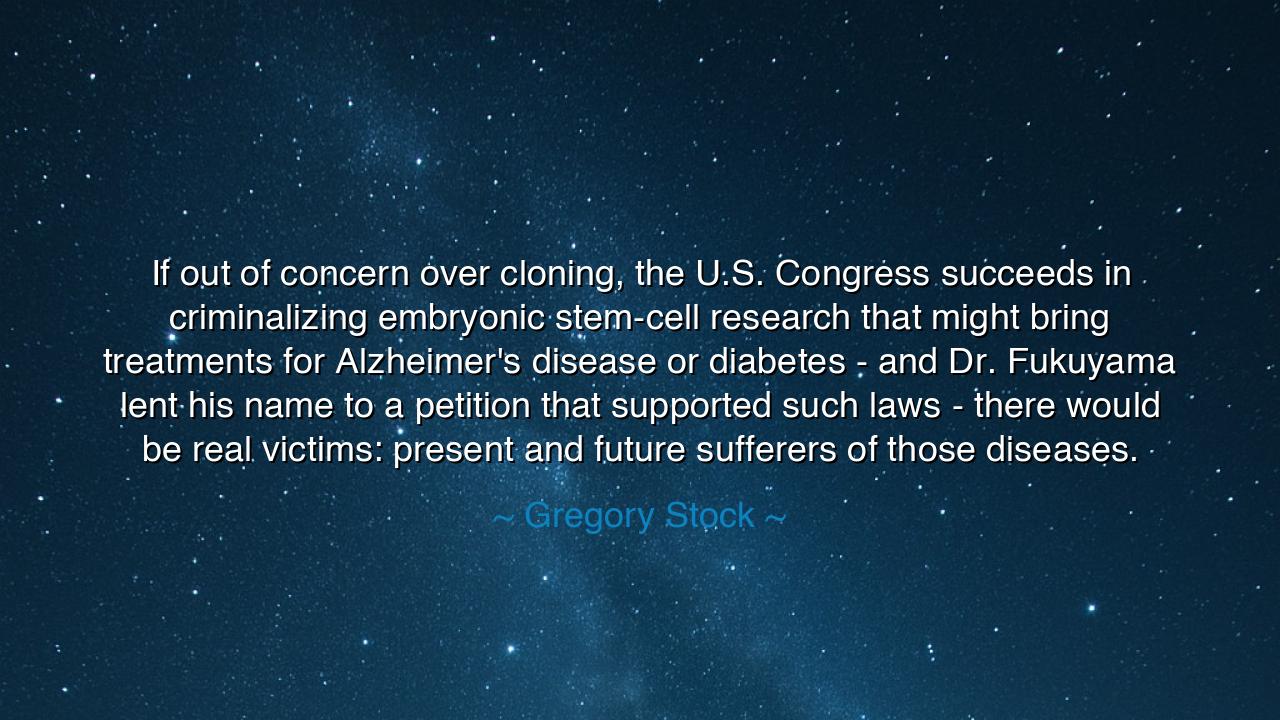
If out of concern over cloning, the U.S. Congress succeeds in
If out of concern over cloning, the U.S. Congress succeeds in criminalizing embryonic stem-cell research that might bring treatments for Alzheimer's disease or diabetes - and Dr. Fukuyama lent his name to a petition that supported such laws - there would be real victims: present and future sufferers of those diseases.






"If out of concern over cloning, the U.S. Congress succeeds in criminalizing embryonic stem-cell research that might bring treatments for Alzheimer's disease or diabetes - and Dr. Fukuyama lent his name to a petition that supported such laws - there would be real victims: present and future sufferers of those diseases." These words, spoken by Gregory Stock, strike at the heart of an ethical dilemma that has echoed through human history: when do we allow the fear of the unknown to hinder progress and prevent the alleviation of suffering? Stock’s warning is a call to action—an urgent plea to not let fear and conservatism cloud the potential for life-saving innovations, especially when those innovations promise to offer solutions to some of humanity’s most devastating diseases.
From the time of the ancients, humanity has wrestled with the balance between moral concerns and the pursuit of advancement. Consider the story of Galileo Galilei, whose observations of the stars led him to challenge the teachings of the church. His scientific discoveries—such as the heliocentric model of the universe—were met with fear and resistance by the powerful institutions of the time, yet his courage to pursue the truth forever changed the way we understand our place in the universe. Similarly, Stock's quote highlights a situation where progress—specifically the potential of embryonic stem-cell research to offer treatments for Alzheimer’s disease and diabetes—may be stifled by those fearful of the unknown consequences of cloning. The ancient conflict between knowledge and fear persists in the modern world.
The fear of cloning and the ethics surrounding it are not new concerns. In ancient civilizations, there were always those who resisted technological and scientific advances, worried that such innovations would overstep the bounds of nature. The invention of the printing press was seen by some as a dangerous tool that could lead to the spread of heresy. Similarly, the advent of the steam engine and the rise of industrialization were feared for their potential to disrupt social and economic order. Stock’s statement draws a parallel between these age-old fears and the modern dilemma we face with stem-cell research—a potential solution to the suffering caused by diseases like Alzheimer’s and diabetes. Yet, instead of embracing these advances, there are those who seek to prevent them out of concern for unintended consequences.
In Dr. Fukuyama’s support of laws criminalizing stem-cell research, we see the conflict between ethics and progress manifest. Stock condemns this position, warning that while the fears about cloning may be valid in certain contexts, the real victims of such actions will be the present and future sufferers of debilitating diseases. Alzheimer’s and diabetes are not abstract concepts—they are real, lived experiences for millions of people and their families. If we allow the fear of cloning to prevent life-saving research, we are turning our backs on those who need help the most. The lesson here is powerful: we must not allow the fear of the unknown to prevent us from pursuing the known good that could heal and save lives.
Consider the plague of smallpox, which for centuries ravaged populations and brought untold suffering to humanity. It was only after Edward Jenner’s pioneering work in the late 18th century, introducing the first successful smallpox vaccine, that humanity began to see the end of this terrible disease. But Jenner’s ideas were initially met with resistance—fearful critics questioned the ethics of using a vaccine derived from cowpox. Yet, his courage to pursue the truth and innovation led to the eventual eradication of smallpox. In the same way, stem-cell research offers the possibility of eliminating the suffering caused by diseases like Alzheimer's and diabetes, but it requires the courage to push forward, despite the ethical concerns that may arise along the way.
The real victims, as Stock so poignantly points out, are those who suffer today and those who will suffer tomorrow. If we are to truly care for those in need, we must weigh the potential benefits of scientific progress against the fears that often surround it. Yes, ethical considerations are important, but they should never blind us to the urgent needs of those whose lives could be improved, even saved, by advancements in medical science. The fear of overstepping moral boundaries should never stop us from striving to alleviate suffering.
The lesson of Stock’s quote is one of courage and action in the face of fear. When faced with a difficult decision, it is easy to retreat into the safety of inaction or to rely on what is comfortable and familiar. But the greatest achievements in human history were not born out of fear, but from the courage to challenge the status quo, to push forward into the unknown, and to embrace progress for the benefit of all. We must be willing to dare to move forward, even when faced with ethical dilemmas, to create a world where the suffering of today can be alleviated by the discoveries of tomorrow.
Practical actions are clear: support scientific innovation, but always with an eye toward ethical responsibility. Ask not only what is possible, but what is needed for the betterment of humanity. Engage in thoughtful discourse on the ethics of research, but also prioritize the lives of those who suffer from diseases that are awaiting solutions. As we step into the future, we must ensure that we embrace progress while maintaining our compassion, recognizing that it is only through this balance that we can truly serve the greater good.






AAdministratorAdministrator
Welcome, honored guests. Please leave a comment, we will respond soon